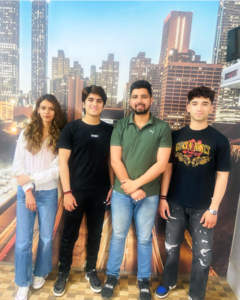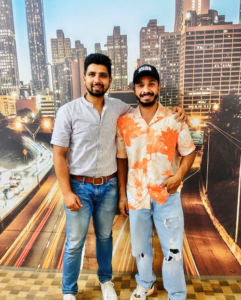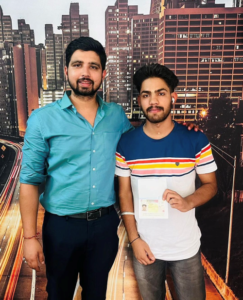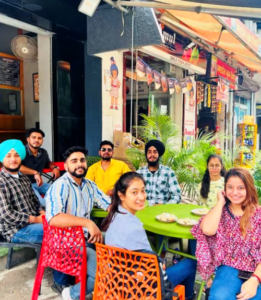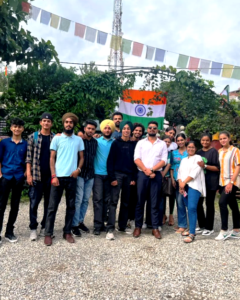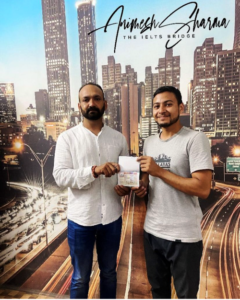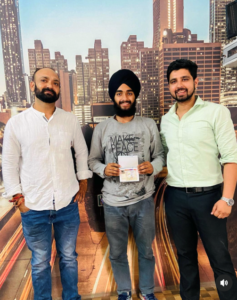Section 1: This text about ‘different festivals’ has no title.
Questions 1-8: Identifying information
[This question asks you to find information from the passage and write the number of the paragraph (A, B, C or D … .. ) in the answer sheet. Now, if the question is given in the very first part of the question set, I’d request you not to answer them. It’s mainly because this question will not follow any sequence, and so it will surely kill your time. Rather, you should answer all the other questions first. And just like List of Headings, only read the first two lines or last two lines of the expected paragraph initially. If you find the answers, you need not read the middle part. If you don’t find answers yet, you can skim the middle part of the paragraph. Keywords will be a useful matter here.]
Question no. 1: Visitors can help to make one particular event a success at this festival.
Keywords for this question: visitors, help, make, one particular event, success,
In paragraph G (Bath International Dance Festival), the writer says in lines 2-3, “ . . .. . the festival promises toe-tapping action, including a world record attempt, where everyone is invited to join in.”
Here, a world record attempt, where everyone is invited to join in = Visitors can help to make one particular event a success,
So, the answer is: G
Question no. 2: People can listen to local musicians here.
Keywords for this question: people, can listen, local musicians,
In paragraph D (Wychwood Music Festival), the author of the text says in lines 2-3, “ .. .. . – many featuring artists from around the Wychwood area – .. . . .”
Here, featuring artists from around the Wychwood area = local musicians,
So, the answer is: D
Question no. 3: At this festival, people can listen to music in lots of different places.
Keywords for this question: people, can listen, lots of different places,
In paragraph B (The Great Escape), lines 1-2 say, “ .. .. . more than 300 bands will perform to around 10,000 people in 30-plus venues, .. .”
Here, 30-plus venues = lots of different places,
So, the answer is: B
Question no. 4: It is not necessary to pay for one of the events here.
Keywords for this question: not necessary, to pay, one of the events,
In paragraph A (Bath International Music Festival), the author says in line no. 2 “ . . .. Starting with a great night of free music, .. . . ..”
Here, free music = not necessary to pay,
So, the answer is: A
Question no. 5: It is possible to stay overnight at this festival.
Keywords for this question: possible, stay overnight,
In paragraph F (The 3 Wishes Faery Festival), the author writes in lines 2-3, “ . .. . .. If you don’t fancy taking a tent, some local residents usually offer to put visitors up.”
Here, some local residents usually offer to put visitors up = possible to stay overnight,
So, the answer is: F
Question no. 6: Children will enjoy this festival.
Keywords for this question: children, will enjoy,
Again, in paragraph D (Wychwood Music Festival), the writer says in the beginning, “Right nominated for the best family festival award every year since it began in 2005, .. .. ..”
Here, best family festival = children will enjoy,
So, the answer is: D
Question no. 7: Visitors can get advice here.
Keywords for this question: visitors, can get advice,
In paragraph E (Love Food Festival), lines 1-2 say, “ . .. . .. this festival aims to educate visitors about how food should be produced and where it should come from, .. .. .”
Here, aims to educate visitors = visitors can get advice,
So, the answer is: E
Question no. 8: People can watch craftspeople at work here.
Keywords for this question: can watch, craftspeople, at work,
The answer can be found in paragraph C (Springwatch Festival), where the writer says in line no. 2, “ . .. .. wood carving demonstrations, .. . . .”
Here, wood carving demonstrations = People can watch craftspeople at work,
So, the answer is: C
BIG ROCK CLIMBING CENTRE
Questions 9-14: TRUE, FALSE, NOT GIVEN
[In this type of question, candidates are asked to find out whether:
The statement in the question agrees with the information in the passage – TRUE
The statement in the question contradicts the information in the passage – FALSE
If there is no information on this – NOT GIVEN
For this type of question, you can divide each statement into three independent pieces and make your way through with the answer.]
Question no. 9: When climbing at the Big Rock Centre, it is compulsory to be attached by a rope.
Keywords for this question: climbing, Big Rock Centre, compulsory, be attached, rope,
Take a look at the first paragraph, in lines 5-6, where the author of the text explains, “ . . . . Or experience the thrills of climbing without any harness in our special low-level arena, . . .. ..”
Here, climbing without any harness = NOT compulsory to be attached by a rope,
So, the answer is: FALSE
Question no. 10: People who just want to watch the climbing can enter the Centre without paying.
Keywords for this question: people, just want to watch, can enter, without paying,
In the final lines of paragraph no. 2 (Who is Big Rock for?), the writer says, “ . .. . If you are visiting the friends or family but not climbing, or just fancy coming to look, please feel free to relax in our excellent cafe overlooking the climbing areas.”
However, NO information is given about payment.
So, the answer is: NOT GIVEN
Question no. 11: People can arrange to have a climbing session in their own garden if they wish.
Keywords for this question: people, can arrange, have, climbing session, their own garden, if they wish,
In the ‘Mobile Climbing Wall’ section, the first few lines say, “Available on a day hire basis at any location, the big Rock Mobile Climbing Wall is the perfect way to enhance any show festival or event . The mobile wall can be used indoors or outdoors .. .. . .. .. .”
Here, Available on a day hire basis at any location = People can arrange to have a climbing session in their own garden if they wish,
So, the answer is: TRUE
Question no. 12: A certain item of clothing is forbidden for participants.
Keywords for this question: certain item, clothing, forbidden, participants,
In lines 7-8 of the ‘Mobile Climbing Wall’ section, the author says, “ . . .. When considering what to wear, we have found that trousers and t-shirts are ideal. We will however, ask people to remove scarves. .. .”
Here, remove scarves = A certain item of clothing is forbidden,
So the answer is: TRUE
Question no. 13: The Mobile Climbing Wall can only be used in dry, calm weather.
Keywords for this question: Mobile Climbing Wall, only, be used, dry, calm weather,
In lines 9-10 of the ‘Mobile Climbing Wall’ section, the author says, “ . . .. The mobile wall is very adaptable and can be operated in light rain and winds up to 50 kph. . .. .”
Here, very adaptable and can be operated in light rain and winds = The Mobile Climbing Wall can be used in dry, calm weather as well as wet weather,
So the answer is: FALSE
Question no. 14: It is inadvisable for children who are afraid of heights to use the Mobile Climbing Wall.
Keywords for this question: inadvisable, children, afraid of heights, use, Mobile Climbing Wall,
In the ‘What about hiring the mobile climbing wall for my school or college?” section, the writer says in lines 3-6, “ . . .. If you are connected that some children may not want to take part because they feel nervous if they climb, then please be assured that our instructors will support them up to a level which they are comfortable with. . .. .”
Here, the lines suggest that it is advisable for children who are afraid of heights to use the Mobile Climbing Wall.
So the answer is: FALSE
Section 2: Marketing advice for new business
Questions 15-20: Completing sentences
In this type of question, candidates are asked to write ONE WORD ONLY to complete sentences on the given topic. For this type of question, first, skim the passage to find the keywords in the paragraph concerned with the answer, and then scan to find the exact word.
[TIPS: Here scanning technique will come in handy. Target the keywords of the questions to find the answers. Remember to focus on Proper nouns, random Capital letters, numbers, special characters of text etc.]
Question 15: Some _________ will help you to discover the most effective places to advertise.
Keywords for this question: will help, discover, most effective places, to advertise,
Take a look at the ‘Know where your customers look’ section, where the author says, “Your customers aren’t necessarily where you think they are. So if you’re advertising where they’re just not looking, it’s wasted money. That’s why it pays to do a bit of research. Every time someone contacts your company, ask them where they found out about you. And act on this information so you’re advertising in the right places.”
Here, it pays = will help you, a bit of = some, advertising in the right places = the most effective places to advertise,
So, the answer is: research
Question 16: A __________ of your customers will show you how they feel about your company.
Keywords for this question: of your customers, will show, how, they feel, your company,
In the ‘Always think like a customer’ section, the author says, “What makes your customers tick? …. A simple phone or email survey of your own customers, politely asking why they use you, what they really like and what they don’t, is invaluable.”
Here, What makes your customers tick? = how they feel about your company,
So, the answer is: survey
Question 17: A ________ of forms of advertising will make it more likely that potential customers will find out about you.
Keywords for this question: forms of advertising, will make, more likely, potential customers, will find out, about you,
In the ‘Make sure customers know you’re there’ section, the writer says, “If a customer can’t see you, they can’t buy from you. There are loads of opportunities to promote your business – print, press, direct mail, telemarketing, email and the internet – and using a mix of these increases your chances of being seen (and remembered). . . ..”
Here, a mix of these = a mix of forms of advertising, increases your chances of being seen = make it more likely that potential customers will find out about you,
So, the answer is: mix
Question 18: If you can, provide customers with useful _________ about your business.
Keywords for this question: if you can, provide customers, useful, about your business,
Lines 3-4 of the ‘Ignore your customers and they’ll go away’ section say, “. .. . Follow up a transaction to check they’re happy with the service and, if possible, send them updates that are helpful, informative and relevant.”
Here, if possible = if you can, send them = provide customers with, helpful, informative and relevant = useful . .. . about your business,
So, the answer is: updates
Question 19: Measuring the effects of your advertising can give you __________ that will improve your business.
Keywords for this question: measuring, effects, your advertising, can give, that will improve, business,
In the ‘Know what works (and what doesn’t) section, the writer says, “Do what the professionals do, and measure all your advertising. That’ll tell you what you’re doing right – and where there’s room for improvement. You never know, it might just throw up some information that could change your business for the better.”
Here, measure all your advertising = Measuring the effects of your advertising, could change your business for the better = will improve your business,
So, the answer is: information
Question 20: Success in finding new customers largely depends on your _______.
Keywords for this question: success, finding new customers, largely depends on,
In the ‘Remember word-of-mouth: the best advertising there is’ section, the writer says, “A recent survey found that consumers are 50% more likely to be influenced by word-of-mouth recommendations than by TV or radio ads. So your reputation is your greatest asset. .. .”
Here, greatest asset = success in finding new customers largely depends on,
So, the answer is: reputation
Working Time Regulations for Mobile Workers
Questions 21-27: Completing notes
[In this type of question, candidates are asked to complete different notes with ONE WORD ONLY from the passage. Keywords are important to find answers correctly. Generally, this type of question maintains a sequence. However, we should not be surprised if the sequence is not maintained. Find the keywords in the passage and you are most likely to find the answers.]
Question 21:
These apply to people working on lorries, buses, etc.
They don’t apply to _________ workers.
Keywords for this question: apply to, lorries, buses, don’t apply to, workers,
The answer can be found in the second paragraph, “Those defined in the Regulations as being self-employed are currently not covered by the Regulations.”
Here, not covered by the Regulations = don’t apply to,
So, the answer is: self employed/ self-employed
Question 22:
Maximum working hours: 60 hours a week, provided the ________ is no more than 48 hours.
Keywords for this question: maximum working hours, 60 hours a week, provided, no more than 48 hours,
The second bullet point of the ‘What are the limits’ section says,
- In any single week, up to 60 hours can be worked so long as the 48-hour average is maintained.
Here, In any single week up to 60 hours = 60 hours a week, so long as = provided, no more than 48 hours = 48-hour average is maintained,
So, the answer is: average
Question 23:
Night work can be more than 10 hours with the _________ of the workers.
Keywords for this question: night work, more than 10 hours, with, of the workers,
The third bullet point of the ‘What are the limits’ section says,
- Night work is limited to 10 hours per night, unless there is a workplace agreement to work longer.
Here, limited to 10 hours per night, unless = can be more than 10 hours, agreement of the workers = workplace agreement,
So, the answer is: agreement
Question 24: Work includes driving, loading and unloading, and carrying out various _______ of the vehicle.
Keywords for this question: work includes, driving, loading and unloading, carrying out, various, of the vehicle,
In the ‘What counts as work?’ section, have a look at the first paragraph, “In general, any activities performed in connection with the transport operation count as work, for example, driving, loading/unloading, and those checks that are the responsibility of drivers, such as checking lights, brakes etc.”
Here, checking lights, brakes etc. = various checks,
So, the answer is: checks
Question 25:
Periods of availability include:
going on a _________ or other form of transport with a vehicle.
Keywords for this question: period of availability, going on, or, other form of transport, with a vehicle,
In the ‘What counts as work?’ section, take a look at the second paragraph. It says here in the third bullet point,
- Accompanying a vehicle being transported, for example by train.
Here, Accompanying = going on,
So, the answer is: train
Question 26:
A period at the workstation when the driver has some ________ might count as a period of availability.
Keywords for this answer: a period at the workstation, when, the driver has, some, might count as, a period of availability,
In the ‘What counts as work?’ section, take a look at the third paragraph. It says here, “A period of availability can be taken at the workstation. Providing the worker has a reasonable amount of freedom (e.g. they can read and relax) for a known duration, this could satisfy the requirements of a period of availability.”
Here, Providing the worker has = when the driver has, a reasonable amount of = some,
So, the answer is: freedom
Question 27:
Periods of availability exclude:
time spent stopping and starting the vehicle when _______ causes delays being in a queue, e.g. in order to load or unload.
Keywords for this answer: periods of availability exclude, time spent, stopping and starting, vehicle, when, causes delay, in a queue, load, unload,
In the ‘What counts as work?’ section, take a look at the fourth paragraph. It says here,
“Situations when a period of time should not be recorded as a period of availability:
- Hold-ups due to congestion, because the driver would be stopping and starting the vehicle.
Here, should not be recorded as a period of availability = Periods of availability exclude, Hold-ups = delays,
So, the answer is: congestion
Section 3: A brief history of automata
Questions 28-30: Summary completion
[In this kind of questions candidates are given a summary for one, two or three paragraphs with some fill in the blanks questions. Candidates need to find out the related paragraphs by correctly studying the keywords from the questions. Then, they should follow the steps of finding answers to fill in the gaps.]
Title of the summary: Automata and the ancient Greeks
Question 28: The ancient Greeks had a number of ________ concerning automata. According to one, the god Hephaestus created two assistants made of gold.
Keywords for this question: ancient Greeks, a number of, concerning automata, god Hephaestus, created, two assistants, gold,
In paragraph no. 1, take a look at lines 3-6, “ . .. . . Several myths show that the ancient Greeks were interested in the creation of automata. In one, Hephaestus, the god of all mechanical arts, was reputed to have made two female statues of pure gold which assisted him and accompanied him wherever he went. … .. .”
Here, several = a number of, interested in the creation of automata = concerning automata,
So, the answer is: myths
Question 29: The Greeks probably also created real automata; it seems most likely that the mechanism which controlled them consisted of ________ which were worked by human operators.
Keywords for this question: Greeks, probably, also created, real automata, most likely, mechanism, controlled them, consisted of, human operators,
In lines 6-8 of paragraph no. 1, the writer of the text says, “ … . .. . As well as giving automata a place in mythology, the Greek almost certainly created some. There were probably activated by levers and powered by human action, although there are descriptions of steam and water being used as sources of power. . .. ..”
Here, the Greek almost certainly created some = The Greeks probably also created real automata, probably = mostly likely, activated by = controlled them consisted of, powered by human action = worked by human operators,
So, the answer is: levers
Question 30: Some automata were designed to be _________ with an educational purpose.
Keywords for this question: some automata, designed to be, with, educational purpose,
The final lines of paragraph no. 1 say, “ . . .. . .. . Automata were sometimes intended as toys, or as tools for demonstrating basic scientific principles.”
Here, intended = designed to be, for demonstrating basic scientific principles = with an educational purpose,
So, the answer is: tools
Questions 31-35: Matching statements with list of people
[In this type of question, candidates need to relate statements that are given by or links to people in the passage. The rules for finding answers to this sort of question are simple. Just find the name of the person and read around it carefully. Then, give a quick look to check whether there is another statement or idea provided by the same person in the text. If there is, check the reference carefully and decide your answer. Remember, the questions may not follow any sequential order.]
Question 31: created an automation that represented a bird in water, interacting with its surroundings
Keywords for this question: created, automation, represented, bird in water, interacting with, surroundings,
We find reference to ‘a bird in water which interacts with its surroundings’ in paragraph no. 6. Let’s read it.
“In another well-known piece, Merlin’s sliver swan made in 1773, the swan sits in a stream consisting of glass rods where small silver fish are swimming. When the clockwork is wound, a music box plays and the glass rods rotate, giving the impression of a flowing stream. The swan turns its head from side to side. It soon notices the fish and bends down to catch and eat one, then raises its head to the upright position. The mechanism still works.”
Here, sliver swan … sits in a stream = a bird in water,
So, the answer is: F (Merlin)
Question 32: created an automation that performed on a musical instrument
Keywords for this question: created, automation, performed on, musical instrument,
The answer lies in paragraph no. 5. Here, take a look at lines 6-9, “ . .. . . Vaucanson produced a duck made of gilded copper which ate, drank and quacked like a real duck. He also made a life-size female flute player. Air passes through the complex mechanism, causing the lips and fingers of the player to move naturally on the flute, opening and closing holes on it. This automation had a repertoire of twelve tunes.”
Here, female flute player = automation that performed on a musical instrument,
So, the answer is: E (Vaucanson)
Question 33: produced documents about how to create automata
Keywords for this question: produced documents, how to create, automata,
The answer can be found in the first lines of paragraph no. 3, where the writer says, “Much later, Arab engineers of the ninth and thirteenth centuries wrote detailed treatises on how to build programmable musical fountains, mechanical servants, and elaborate clocks. . . .. . .. .”
Here, wrote detailed treatises = produced documents,
how to build programmable musical fountains, mechanical servants, and elaborate clocks = how to create automata,
So, the answer is: B (Arab engineers)
Question 34: created automata which required a human being to operate the mechanism
Keywords for this question: created automata, required, human being, operate, mechanism,
Again, the answer can be found in paragraph no. 5, as lines 4-6 say, “ . .. .. Maillardet made extensive use of gearing and cogs to produce automata of horses, worked by turning a handle. . . .. ..”
Here, produce automata = created automata, worked by turning a handle = required a human being to operate the mechanism,
So, the answer is: D (Maillardet)
Question 35: used air and water power
Keywords for this answer: used, air and water power,
In the second paragraph, the writer says in lines 1-3, “ . …. In Egypt, Ctesibius experimented with air pressure and pneumatic principles. One of his creations was a singing blackbird powered by water. .. . .. .”
Here, with air pressure & powered by water = used air and water power,
So, the answer is: A (Ctesibius)
Questions 36-40: Completing sentences with ONE WORD ONLY
In this type of question, candidates are asked to write maximum one word to complete sentences on the given topic. For this type of question, first, skim the passage to find the keywords in the paragraph concerned with the answer, and then scan to find the exact word.
[TIPS: Here scanning technique will come in handy. Target the keywords of the questions to find the answers. Remember to focus on Proper nouns, random Capital letters, numbers, special characters of text etc.]
Question 36: The Mechanical Theatre shows court life inside a ________.
Keywords for this question: The Mechanical Theatre, shows, court life, inside,
We find the reference to the Mechanical Theatre in paragraph no. 8, in the first line. Here, in lines 4-5 the writer says, “ . . . .. The figures inside a palace depict eighteenth-century court life, . . .. . ..”
So, the answer is: palace
Question 37: In the Mechanical Theatre, building workers, butchers and a barber represent various _______ of the time.
Keywords for this question: the Mechanical Theatre, building workers, butchers, a barber, represent, various, of the time,
Section D talks about the use of pans for extracting gold.
In paragraph no. 8, take a look at lines 5-8, “ . . . .. . A total of 141 mobile and 52 immobile little figures demonstrate all manner of trades of the period: building workers bring materials to the foreman, who drinks; butchers slaughter an ox; a barber shaves a man. .. .. ..”
Here, demonstrate all manner of = represent various, of the period = of the time,
So, the answer is: trades
Question 38: _________ provides the power that operates the Mechanical Theatre.
Keywords for this question: provides, the power, operates, the Mechanical Theatre,
We can’t find the answer directly in the passage. However, if you closely look at the final lines of paragraph no. 8, the writer says here, “ . . .. . The theatre shows great skill in clock making and water technology, consisting of hidden waterwheels, copper wiring and cogwheels.”
Here, hidden waterwheels, copper wiring and cogwheels indicate that the theatre was run by water power.
So, the answer is: water
Question 39: New _______ that developed in the nineteenth century reduced the cost of the production of automata.
Keywords for this question: new, developed, nineteenth century, reduced, cost of the production, automata,
In the final paragraph, take a look at the very first lines, where the author of the text says, “During the nineteenth century, mass production techniques meant that automata could be made cheaply and easily, . . .. ..”
Here, mass production techniques = new techniques that developed,
automata could be made cheaply = reduced the cost of the production of automata,
So, the answer is: techniques
Question 40: During the nineteenth century, most automata were intended for use by _________.
Keywords for this question: during, nineteenth century, most automata, intended for, use by,
Again, take a close look at lines 1-3 of the final paragraph, “During the nineteenth century, mass production techniques meant that automata could be made cheaply and easily, and they became toys for children rather than an expensive adult amusement. . .. ..”
Here, they became toys for = most automata were intended for use by,
So, the answer is: children


